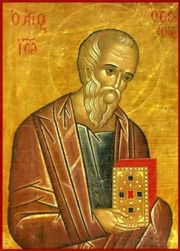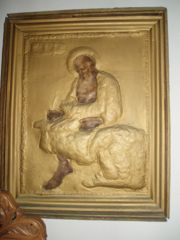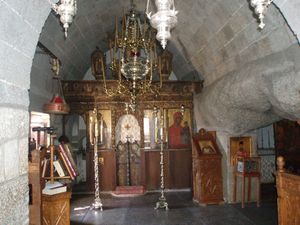Jean le Théologien : Différence entre versions
(Nouvelle page : right|frame|St. Jean le Théologien, Apôstre et Évangéliste [[Image:JohnTheologian.JPG|right|thumb|180px|Old icon of the Theologian, [[w:Nisyros|...) |
|||
| Ligne 1 : | Ligne 1 : | ||
| + | {{Traduire}} | ||
[[Image:John the Theologian.jpg|right|frame|St. Jean le Théologien, Apôstre et Évangéliste]] | [[Image:John the Theologian.jpg|right|frame|St. Jean le Théologien, Apôstre et Évangéliste]] | ||
[[Image:JohnTheologian.JPG|right|thumb|180px|Old icon of the Theologian, [[w:Nisyros|Nisyros]] ([[w:Paros|Paros island]])]] | [[Image:JohnTheologian.JPG|right|thumb|180px|Old icon of the Theologian, [[w:Nisyros|Nisyros]] ([[w:Paros|Paros island]])]] | ||
[[Image:Patmos.JPG|right|thumb|Inside the Cave of the Apocalypse - showing the rock with the "trinitarian" split]] | [[Image:Patmos.JPG|right|thumb|Inside the Cave of the Apocalypse - showing the rock with the "trinitarian" split]] | ||
| − | Le saint, glorieux et illustre '''Apôtre et Évangéliste Jean''' est aussi connu comme '''Jean le Théologien'''. Il a été un des douze [[Apôtres]] et l'auteur de plusieurs écrits du [[Nouveau Testament]]: un [[Évangile selon saint Jean|évangile qui porte son nom]], trois lettres - [[I Jean]], [[II Jean]], and [[III Jean]] - et du [[Livre de l'Apocalypse]]. Il est | + | Le saint, glorieux et illustre '''Apôtre et Évangéliste Jean''' est aussi connu comme '''Jean le Théologien''' ou '''Jean l'Apôtre''' (ou même le « Disciple bien-aimé ») pour le distinguer de [[Jean Baptiste]], le précurseur de Jésus. Il a été un des douze [[Apôtres]] et l'auteur de plusieurs écrits du [[Nouveau Testament]]: un [[Évangile selon saint Jean|évangile qui porte son nom]] (le « Quatrième [[Évangile]] », pour le distinguer des trois autres, dits « [[Évangiles synoptiques]] »), trois lettres - [[I Jean]], [[II Jean]], and [[III Jean]] - et du [[Livre de l'Apocalypse]], dit aussi "Apocalypse de Jean". Il est commémore le [[8 mai]] (Synaxe du St Apôtre et Évangéliste Jean le Théologien), avec les Douze, le [[30 juin]], et le [[26 septembre]] (fête de sa dormition). |
| − | St. | + | St. Jean a été le fils de Zébédée (et pêcheur comme son père) et de Marie Salomée la myrophore and [[Zebedée]]. Il a pour frère un autre apôtre : Jacques le Majeur. |
In his own Gospel account, he refers to himself as "the disciple whom [[Jesus]] loved" rather than use his name. He was the youngest of the twelve apostles, and especially close to the Lord. This closeness is often portrayed in [[icon]]s of the [[Last Supper icon|mystical supper]], where St. John leans on Jesus. | In his own Gospel account, he refers to himself as "the disciple whom [[Jesus]] loved" rather than use his name. He was the youngest of the twelve apostles, and especially close to the Lord. This closeness is often portrayed in [[icon]]s of the [[Last Supper icon|mystical supper]], where St. John leans on Jesus. | ||
| Ligne 16 : | Ligne 17 : | ||
When over 100 years old, St. John took seven [[disciple]]s outside of Ephesus and had them dig a grave in the shape of a cross. St. John then went into the grave, and the disciples buried him there, alive. Later on, when his grave was opened, St. John's body was not there. 'On May 8 of each year, dust rises up from his grave, by which the sick are healed of various diseases.' " [http://web.archive.org/web/20051223042937/http://www.neepeople.com/journeymanjames/st-john-the-theologian.html] | When over 100 years old, St. John took seven [[disciple]]s outside of Ephesus and had them dig a grave in the shape of a cross. St. John then went into the grave, and the disciples buried him there, alive. Later on, when his grave was opened, St. John's body was not there. 'On May 8 of each year, dust rises up from his grave, by which the sick are healed of various diseases.' " [http://web.archive.org/web/20051223042937/http://www.neepeople.com/journeymanjames/st-john-the-theologian.html] | ||
| − | == | + | == Voir aussi == |
*[[Patmos]] | *[[Patmos]] | ||
| Ligne 44 : | Ligne 45 : | ||
:à la table du Seigneur, tout près du Christ, en ami. | :à la table du Seigneur, tout près du Christ, en ami. | ||
| − | == | + | ==Liens externes== |
| − | + | *[http://www.icones-grecques.com/icones_saints/11-saint-jean-le-theologien.html Icône de saint Jean le Théologien] | |
| − | + | *[http://calendrier.egliseorthodoxe.com/sts/stsseptembre/sept26.html Le synaxaire du jour de 26 septembre] | |
| − | |||
| − | |||
| − | *[http://www. | ||
| − | *[http:// | ||
| − | |||
| − | |||
[[Category:Saints bibliques|Jean le Théologien]] | [[Category:Saints bibliques|Jean le Théologien]] | ||
Version du 27 septembre 2008 à 22:46
| Cet article (ou bien des fragments) est proposé pour être traduit en français!
Si vous désirez assumer la traduction (partiellement ou intégralement), annoncez svp cela dans la page de discussions de l'article. |
Le saint, glorieux et illustre Apôtre et Évangéliste Jean est aussi connu comme Jean le Théologien ou Jean l'Apôtre (ou même le « Disciple bien-aimé ») pour le distinguer de Jean Baptiste, le précurseur de Jésus. Il a été un des douze Apôtres et l'auteur de plusieurs écrits du Nouveau Testament: un évangile qui porte son nom (le « Quatrième Évangile », pour le distinguer des trois autres, dits « Évangiles synoptiques »), trois lettres - I Jean, II Jean, and III Jean - et du Livre de l'Apocalypse, dit aussi "Apocalypse de Jean". Il est commémore le 8 mai (Synaxe du St Apôtre et Évangéliste Jean le Théologien), avec les Douze, le 30 juin, et le 26 septembre (fête de sa dormition).
St. Jean a été le fils de Zébédée (et pêcheur comme son père) et de Marie Salomée la myrophore and Zebedée. Il a pour frère un autre apôtre : Jacques le Majeur.
In his own Gospel account, he refers to himself as "the disciple whom Jesus loved" rather than use his name. He was the youngest of the twelve apostles, and especially close to the Lord. This closeness is often portrayed in icons of the mystical supper, where St. John leans on Jesus.
He was present for the Transfiguration of Christ with Peter and his brother James.
St. John was exiled to the island of Patmos by Emperor Domitian around 90-95 A.D., and it was there that he received and wrote the Book of Revelation.
"Account of the miracle that occurred at his grave: When over 100 years old, St. John took seven disciples outside of Ephesus and had them dig a grave in the shape of a cross. St. John then went into the grave, and the disciples buried him there, alive. Later on, when his grave was opened, St. John's body was not there. 'On May 8 of each year, dust rises up from his grave, by which the sick are healed of various diseases.' " [1]
Voir aussi
Hymnes
Tropaire, ton 2 (26 septembre)
- Apôtre bien-aimé du Christ notre Dieu,
- hâte-toi de délivrer un peuple sans défense.
- Celui qui t'a permis de t'incliner sur sa poitrine te permettra
- de t'incliner vers lui pour plaider en notre faveur.
- Demande-lui de dissiper les ténèbres du paganisme des nations;
- qu'il nous accorde la paix et la grâce du salut!
Kondakion (Ton 2)
- Tes hauts faits, Disciple vierge, qui en fera le récit?
- Tu répands les miracles, en effet,
- comme une source tu fais jaillir les guérisons
- et pour nos âmes tu intercèdes auprès du Christ, en ami.
- Connaître la hauteur des cieux et sonder la profondeur de la mer
- est chose audacieuse, dépassant nos moyens;
- pas plus que de compter les étoiles ou le sable du littoral
- nous ne pouvons conter les merveilles de saint Jean:
- de tant de couronnes l'a ceint le Christ, qu'il aimait
- et sur la poitrine duquel il se pencha
- au cours du mystique repas
- à la table du Seigneur, tout près du Christ, en ami.


